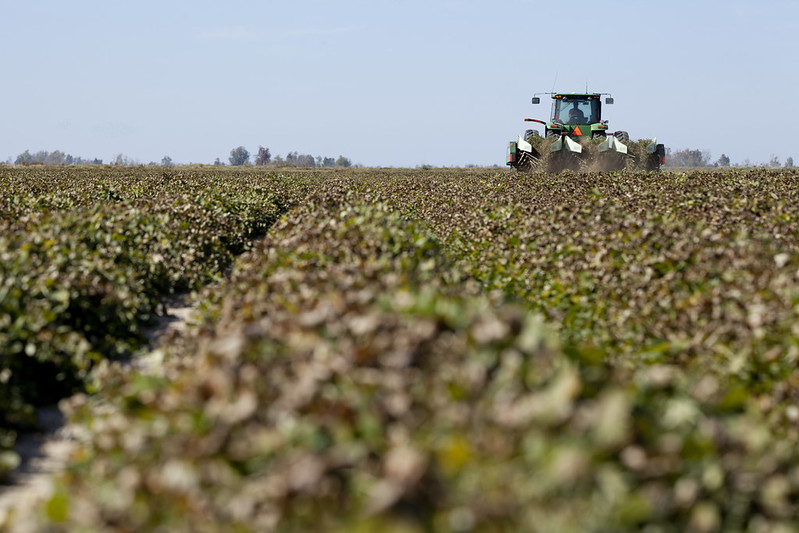Dec. 17, 2021
YEAREND: Arkansas peanuts remain attractive
By Ryan McGeeney
U of A System Division of Agriculture
Fast Facts:
- Low disease pressure year for crop
- High commodity prices for cotton, soybean may lure growers away in 2022
(393 words)
LITTLE ROCK — Peanuts again proved to be a popular, if somewhat niche, investment for Arkansas growers in 2021.
Andy Vangilder, agriculture and natural resources extension educator for the University of Arkansas System Division of Agriculture, said that as long as growers can get about 5,000 pounds in yield per acre, peanuts will remain an economically attractive crop for the foreseeable future.
“The thing with peanuts is that you can plant it on your worst land,” Vangilder said. “They will make you money where nothing else will.”
Arkansas peanut growers averaged about 4,800 pounds per acre in 2020, according to the USDA Crop Production Summary, published in January of this year.
As of Dec. 7, USDA’s Farm Service Agency listed national peanut prices as ranging from about $413 a ton for Spanish peanuts to more than $427 a ton for Valencia and Virginia peanuts. Runner peanuts were listed at about $424 a ton.
Despite relatively frequent rainfall in northeastern Arkansas, where a majority of the state’s peanuts are grown, most planted acres produced good yields, Vangilder said. The rainy weather, which dominated both the planting and harvesting phases of the year, meant later-than-hoped-for peanuts — both going into the ground and coming out.
“We started out pretty good,” Vangilder said. “We had a pretty good planting season even if it was short. A lot of the plants were wet, and we had to do everything during a narrow window.
“This happens to some degree every year,” he said. “A number of plants get planted in less-than-desirable conditions, a little early, and you end up with some skimpy stands. But overall, we had a nice, good-looking peanut crop the majority of the year.”
While growers in some areas of Randolph and Lawrence counties struggled with outbreaks of sclerotinia, a pathogenic fungus that often affects peanuts to some degree each year, disease pressure was relatively low for Arkansas peanuts in 2021, Vangilder said.
The plant’s utility notwithstanding, Arkansas peanut acreage in 2022 could be reduced slightly in the shadow of high market prices for cotton, soybean and other crops, Vangilder said.
“If cotton stays about $1 a pound, and soybeans keep selling for $12 or $13 a bushel, you may see growers start to change their minds about peanuts,” he said. “But we really don’t know what the markets will do, one year to the next.”
To learn about extension programs in Arkansas, contact your local Cooperative Extension Service agent or visit www.uaex.uada.edu. Follow us on Twitter and Instagram at @AR_Extension. To learn more about Division of Agriculture research, visit the Arkansas Agricultural Experiment Station website: https://aaes.uark.edu. Follow on Twitter at @ArkAgResearch. To learn more about the Division of Agriculture, visit https://uada.edu/. Follow us on Twitter at @AgInArk.
About the Division of Agriculture
The University of Arkansas System Division of Agriculture’s mission is to strengthen agriculture, communities, and families by connecting trusted research to the adoption of best practices. Through the Agricultural Experiment Station and the Cooperative Extension Service, the Division of Agriculture conducts research and extension work within the nation’s historic land grant education system.
The Division of Agriculture is one of 20 entities within the University of Arkansas System. It has offices in all 75 counties in Arkansas and faculty on five system campuses.
Pursuant to 7 CFR § 15.3, the University of Arkansas System Division of Agriculture offers all its Extension and Research programs and services (including employment) without regard to race, color, sex, national origin, religion, age, disability, marital or veteran status, genetic information, sexual preference, pregnancy or any other legally protected status, and is an equal opportunity institution.
# # #
Media contact:
Ryan McGeeney
Communications Services
University of Arkansas System Division of Agriculture
Cooperative Extension Service
(501) 671-2120
rmcgeeney@uada.edu
